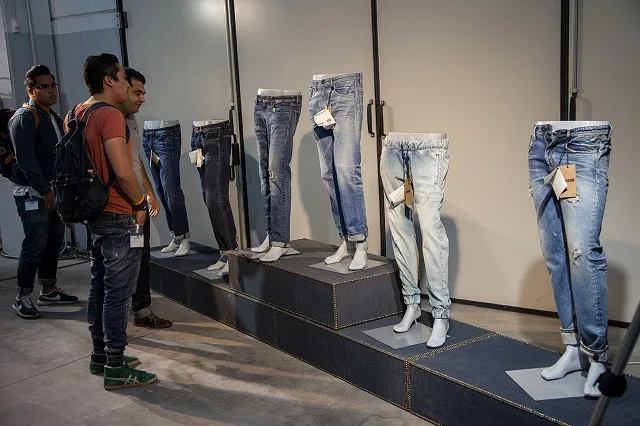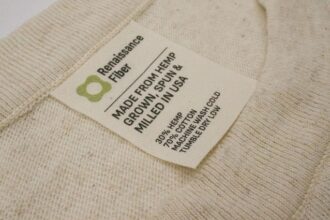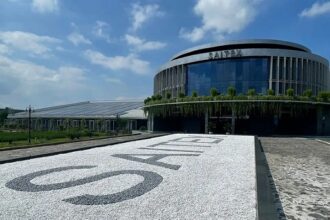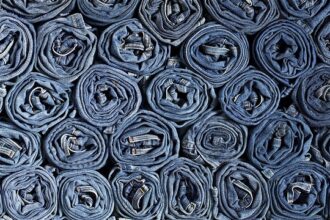Turkish denim manufacturer Calik Denim has adopted AGXX®, an anti-odour and antimicrobial technology developed by Germany’s Heraeus Precious Metals, in a move aimed at reducing environmental impact and extending the life cycle of denim garments.
AGXX, introduced last year by Heraeus, works through a catalytic process that activates in the presence of oxygen and moisture, producing reactive oxygen species that eliminate bacteria and neutralise odour-causing sweat acids. Unlike conventional silver-ion technologies, AGXX does not release harmful chemicals or lose effectiveness after repeated washes, according to Heraeus.
The technology, certified with the ECO PASSPORT by OEKO-TEX and compliant with the EU Biocidal Products Regulation (BPR), has been tested under ISO standards 22196 and 20743, showing a 99.9% reduction in bacterial load. It has also been registered in the OEKO-TEX ACP list, ensuring recognised chemical safety standards.
Also Read: German sustainable fashion label Armedangels to join ZDHC as signatory friend
“With the partnership with Heraeus Precious Metals and its innovative technology AGXX, we can continue to pursue our chosen path with determination, leading the sustainable transformation of the industry together,” said Ibrahim Ethem Buyukpepe, Acting General Manager of Calik Denim.
Calik Denim strengthens sustainable portfolio
Founded in 1987 and headquartered in Malatya, Turkey, Calik Denim is one of the country’s largest integrated denim manufacturers. The company exports to more than 40 countries and counts major international fashion retailers among its clients.
The adoption of AGXX builds on Calik Denim’s track record of sustainable innovation. Previous technologies introduced by the company include B210, a biodegradable denim innovation, and Dyepro, a dyeing process that cuts water use by 40% compared to conventional methods.
Industry analysts say AGXX could help denim mills respond to increasing consumer and regulatory pressure for sustainable, durable and hygienic clothing. By reducing odour, AGXX-treated fabrics allow consumers to wash garments less frequently, lowering water, energy and detergent use while maintaining garment quality.
Also Read: New Report Challenges Denim’s Vague Sustainability Claims
Heraeus expands into textile applications
Heraeus Precious Metals, based in Hanau, Germany, is a leading supplier of precious metal-based materials and technologies. The company developed AGXX initially for medical, military and space applications before adapting it for textiles and consumer goods.
The firm has already secured partnerships with AUX Corporate Fashion and NOMS Global, and industry insiders suggest that Calik Denim could act as a key reference partner for the adoption of AGXX in mass-market apparel.
Challenges ahead
Despite the promise, the integration of AGXX raises questions over cost implications for large-scale denim production, as well as how the treatment affects the fabric’s look, feel and drape. Market acceptance will also depend on whether consumers are willing to pay a premium for antimicrobial finishes.
Still, experts say antimicrobial denim could gain traction as health-conscious and sustainability-aware consumers demand more from their wardrobes. “Functional denim is no longer niche – it’s becoming part of the mainstream,” said a European textile consultant.
Global denim market context
The global denim market, valued at USD 64 billion in 2023, is projected to grow steadily, driven by demand for sustainable fabrics and performance finishes, according to market research firm Statista. Producers in Turkey, Bangladesh, Pakistan, and China are increasingly investing in low-impact production methods to remain competitive in the European and U.S. markets.
By introducing AGXX, Calik Denim positions itself at the intersection of sustainability, hygiene, and innovation, aligning with global fashion brands’ goals to reduce environmental footprints while offering consumers enhanced product value.
Bottom line
Calik Denim’s adoption of Heraeus’s AGXX marks a milestone in the integration of high-tech antimicrobial finishes into mainstream denim. If successful, it could set a precedent for broader uptake of functional, odour-resistant denim in the global apparel market, bridging the gap between fashion, performance and sustainability.


